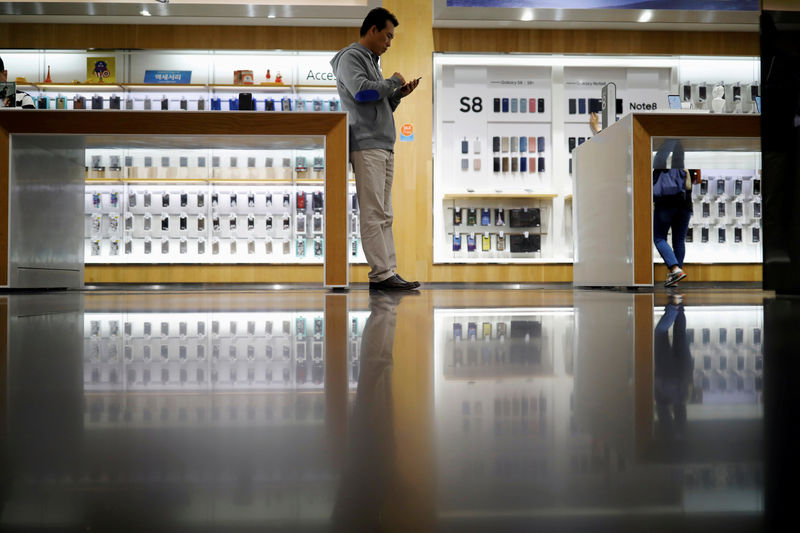By Dahee Kim
SEOUL (Reuters) - Global demand for tech products has helped Samsung Electronics' shares surge about 50 percent this year, outpacing gains in the wider market, but the Korean conglomerate's rally has another, more esoteric driver: its new focus on minor shareholders.
Analysts say Samsung is among a handful of firms tackling the so-called "Korea discount" in stock markets, a consequence of some of the lowest dividend payouts in major equity markets and the dominance of opaque conglomerates known as chaebols.
In addition to favorable cyclical drivers, a push for a "stewardship code" could give the market a structural boost by encouraging big investors to agitate for better governance and shareholder returns.
"Governance concerns have historically resulted in a cheap market remaining cheap," said Matthew Vaight, a global emerging markets portfolio manager in London's M&G Investment.
"The chaebols have a history of being run primarily in the interests of the controlling shareholders, be that evidenced by low dividend payouts or the circular shareholder structures and resultant intra-group transactions."
A stewardship code adopted in the United Kingdom in 2010 aimed to improve the relationship between investors and firms by lifting long-term risk-adjusted returns to shareholders.
New President Moon Jae-in has signaled support for a stewardship code in South Korea, which, though not legally binding, would encourage institutional investors to more actively engage in corporate governance issues on behalf of smaller shareholders.
A possible move by Korean's National Pension Service, the world's third-biggest pension fund, to implement it would help convince other companies to get on board.
About 40 investment companies in South Korea are set to join this year, according to Korea Corporate Governance Service, the organization that introduced the code to the country.
For a graphic on Asian emerging markets, click http://fingfx.thomsonreuters.com/gfx/rngs/ASIA-STOCK/0100219X36Y/index.html
From the corporate side, the Korea Stock Exchange adopted a governance code this year and about 70 listed firms are on board, including majors Samsung Electronics (KS:005930), Hyundai Motor Co, POSCO, Kia Motors Corp and LG Chem.
"Such actions from large conglomerates will all improve the stockholder value, which is the goal of the stewardship code, and the movement is likely to spread widely," said Park Jung-hoon, a fund manager at HDC Asset Management.
In its bid to boost its governance profile, particularly in relation to shareholder returns, Samsung says it has increased its dividend and reduced treasury stocks.
Wider moves to give investors a greater voice and improve corporate governance, if they materialize, could promote a sustained structural shift higher in the Seoul market in coming years.
The Korea Composite Stock Price Index (KOSPI) has risen 22.5 percent so far this year, hitting record highs and breaking out of long-held ranges, despite risks with North Korea.
Yet the market's return on equity (ROE) of 8.17 is still one of the lowest among the countries covered by MSCI. The average ROE is 11.85, while the United States stands at 16.66, according to data compiled by Reuters as of mid-October.
The country's dividend payout ratio is also very low at 16.43, less than half the MSCI average of 38.95.
"If South Korea's dividend payout ratio is pulled up to Japan's 27.6 percent, which is currently at the bottom 25 percent of those included in MSCI, the KOSPI is very likely to have another big leap," said Cho Byung-hyun, a stock analyst at Yuanta Securities in Seoul.
BIG PLAYERS NEED TO LEAD
While initiatives to bolster Korea Inc's governance profile are progressing, the shift is modest in a country dominated by chaebols and when compared with similar moves in Japan.
"It's key to have some big companies and big investors leading the way," said Michael Herskovich, head of corporate governance at BNP Paribas (PA:BNPP) Asset Management in Paris. As an example, Herskovich said Toyota Motor Corp's decision to incorporate external oversight changed the game for smaller and mid-cap Japanese companies.
In 2015, Japan introduced a corporate governance code to encourage investors to voice concerns and force companies to be more responsive to them. Combined with a stewardship code that made fund managers more accountable for their votes, it was seen as making companies more focused on improving returns.
M&G Investment's Vaight said Samsung Electronics had been leading the way in South Korea with higher dividends and a better approach to share buybacks.

"Korea is home to some very profitable and successful companies who are now beginning to share their cash flows with minority investors," he said.
(Additional Reporting by Cynthia Kim, Nichola Saminather, Patturaja Murugaboopathy, Gaurav S. Dogra; Editing by John Mair and Sam Holmes)